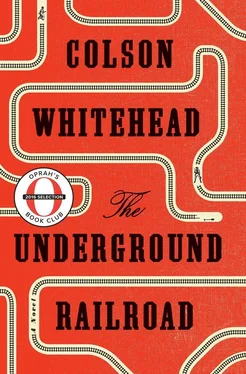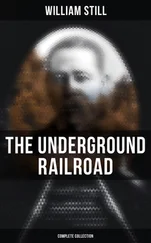One of those who had gathered to push the ramp away was ejected — he’d already taken his turn at a previous festival. A young brunette in a pink polka-dot dress rushed to take his place.
Cora turned away before the girl swung. She crawled to the opposite side of the nook, in the corner of her latest cage. Over the next several months, on nights when it was not too suffocating, she preferred that corner for sleeping. It was as far from the park, the miserable thumping heart of the town, as she could get.
The town hushed. Jamison gave the word.

To explain why he and his wife kept Cora imprisoned in their attic, Martin had to go back a ways. As with everything in the south, it started with cotton. The ruthless engine of cotton required its fuel of African bodies. Crisscrossing the ocean, ships brought bodies to work the land and to breed more bodies.
The pistons of this engine moved without relent. More slaves led to more cotton, which led to more money to buy more land to farm more cotton. Even with the termination of the slave trade, in less than a generation the numbers were untenable: all those niggers. Whites outnumbered slaves two to one in North Carolina, but in Louisiana and Georgia the populations neared parity. Just over the border in South Carolina, the number of blacks surpassed that of whites by more than a hundred thousand. It was not difficult to imagine the sequence when the slave cast off his chains in pursuit of freedom — and retribution.
In Georgia and Kentucky, South America and the Caribbean Isles, the Africans turned on their masters in short but disturbing encounters. Before the Southampton rebellion was smothered, Turner and his band murdered sixty-five men, women, and children. Civilian militias and patrollers lynched three times that in response — conspirators, sympathizers, and innocents — to set an example. To clarify the terms. But the numbers remained, declaring a truth unclouded by prejudice.
“Around here, the closest thing to a constable was the patroller,” Martin said.
“Most places,” Cora said. “Patroller will harass you anytime they feel like.” It was after midnight, her first Monday. Martin’s daughter and her family had returned home, as had Fiona, who lived down the road in Irishtown. Martin perched on a crate in the attic, fanning himself. Cora paced and stretched her sore limbs. She had not stood in days. Ethel declined to appear. Dark blue drapes hid the windows and the small candle licked at the gloom.
Despite the hour, Martin spoke in a whisper. His next-door neighbor’s son was a night rider.
As the slave owners’ enforcers, the patrollers were the law: white, crooked, and merciless. Drawn from the lowest and most vicious segment, too witless to even become overseers. (Cora nodded in agreement.) The patroller required no reason to stop a person apart from color. Slaves caught off the plantation need passes, unless they wanted a licking and a visit to the county jail. Free blacks carried proof of manumission or risked being conveyed into the clutches of slavery; sometimes they were smuggled to the auction block anyway. Rogue blacks who did not surrender could be shot. They searched slave villages at will and took liberties as they ransacked the homes of freemen, stealing hard-earned linens or making licentious advances.
In war — and to put down a slave rebellion was the most glorious call to arms — the patrollers transcended their origins to become a true army. Cora pictured the insurrections as great, bloody battles, unfurling beneath a night sky lit by vast fires. From Martin’s accounts, the actual uprisings were small and chaotic. The slaves walked the roads between towns with their scavenged weapons: hatchets and scythes, knives and bricks. Tipped by colored turncoats, the white enforcers organized elaborate ambushes, decimating the insurgents with gunfire and running them down on horseback, reinforced by the might of the United States Army. At the first alarms, civilian volunteers joined the patrollers to quell the disturbance, invading the quarters and putting freemen’s homes to the torch. Suspects and bystanders crammed the jails. They strung up the guilty and, in the interest of prevention, a robust percentage of the innocent. Once the slain had been avenged — and more important, the insult to white order repaid with interest — the civilians returned to their farms and factories and stores, and the patrollers resumed their rounds.
The revolts were quashed, but the immensity of the colored population remained. The verdict of the census lay in glum columns and rows.
“We know it, but don’t say it,” Cora told Martin.
The crate creaked as Martin shifted.
“And if we say, we don’t say it for anyone to hear,” Cora said. “How big we are.”
On a chilly evening last autumn, the powerful men of North Carolina convened to solve the colored question. Politicians attuned to the shifting complexities of the slavery debate; wealthy farmers who drove the beast of cotton and felt the reins slipping; and the requisite lawyers to fire the soft clay of their schemes into permanence. Jamison was present, Martin told Cora, in his capacities as a senator and local planter. It was a long night.
They assembled in Oney Garrison’s dining room. Oney lived atop Justice Hill, so named because it allowed one to see everything below for miles and miles, placing the world in proportion. After this night their meeting would be known as the Justice Convention. Their host’s father had been a member of the cotton vanguard and a savvy proselytizer of the miracle crop. Oney grew up surrounded by the profits of cotton, and its necessary evil, niggers. The more he thought about it — as he sat there in his dining room, taking in the long, pallid faces of the men who drank his liquor and overstayed their welcome — what he really wanted was simply more of the former and less of the latter. Why were they spending so much time worrying about slave uprisings and northern influence in Congress when the real issue was who was going to pick all this goddamned cotton?
In the coming days the newspapers printed the numbers for all to see, Martin said. There were almost three hundred thousand slaves in North Carolina. Every year that same number of Europeans — Irish and Germans mostly, fleeing famine and political unpleasantness — streamed into the harbors of Boston, New York, Philadelphia. On the floor of the state house, in the editorial pages, the question was put forth: Why cede this supply to the Yankees? Why not alter the course of that human tributary so that it fed southward? Advertisements in overseas papers promoted the benefits of term labor, advance agents expounded in taverns and town meetings and poorhouses, and in due course the charter ships teemed with their willing human cargo, bringing dreamers to the shores of a new country. Then they disembarked to work the fields.
“Never seen a white person pick cotton,” Cora said.
“Before I came back to North Carolina, I’d never seen a mob rip a man limb from limb,” Martin said. “See that, you stop saying what folks will do and what they won’t.”
True, you couldn’t treat an Irishman like an African, white nigger or no. There was the cost of buying slaves and their upkeep on one hand and paying white workers meager but livable wages on the other. The reality of slave violence versus stability in the long term. The Europeans had been farmers before; they would be farmers again. Once the immigrants finished their contracts (having paid back travel, tools, and lodging) and took their place in American society, they would be allies of the southern system that had nurtured them. On Election Day when they took their turn at the ballot box, theirs would be a full vote, not three-fifths. A financial reckoning was inevitable, but come the approaching conflict over the race question, North Carolina would emerge in the most advantageous position of all the slave states.
Читать дальше













